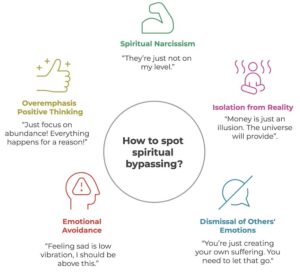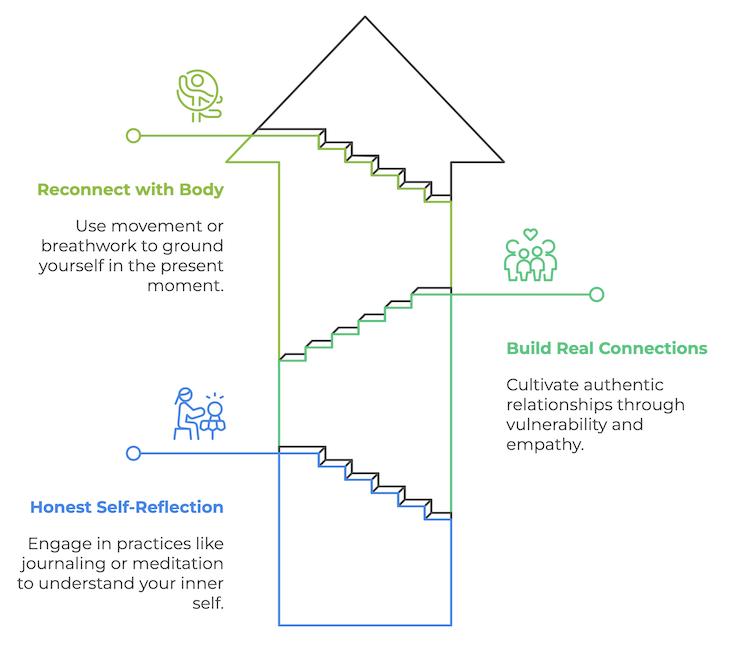Francisca Niklitschek
Contributing Authors
Dmitrij Achelrod PhD
Francisca Niklitschek
The search for spiritual awakening often begins with a quiet feeling that something is missing, and a hope that something more is possible, something more meaningful, more expansive, more whole. We immerse ourselves in practices that promise peace and clarity: meditation, prayer, sacred rituals, teachings that speak to the soul. With each step, we hope to shed the layers that keep us from our truest selves.
But somewhere along the way, a subtle trap can arise: one that looks like progress, yet quietly keeps us stuck. Spiritual bypassing is this hidden detour: the tendency to use spiritual beliefs and practices to avoid uncomfortable emotions, unresolved wounds, and deeper psychological truths. It’s the serene mask over inner chaos, the glow of positivity that hides unspoken pain.
To be clear, spiritual practices can be profoundly supportive, but when used to escape rather than engage, they can become barriers to genuine healing. This tension invites us to ask: are we using our spirituality to open up to our vulnerability, or to avoid it?
This isn’t about blame, it’s about awareness. And spiritual bypassing isn’t failure, it’s a coping strategy. And recognizing it is not a sign you’re doing it wrong, it’s a sign that you’re ready to go deeper.
At Evolute Institute, we are committed to supporting deep personal and professional transformation with our self-exploration retreats programs. We believe that real growth happens when we embrace the full spectrum of human experience: not just the light, but also the shadow. As we explore topics like spiritual bypassing, it becomes clear that authentic self-development is not about escaping discomfort but about learning to move through it with awareness and compassion, the two wings of mindfulness.
In the pages ahead, we’ll explore how spiritual bypassing shows up and how to meet it with honesty, compassion, and courage. If you’re ready to trade perfection for presence, let’s begin. Because the real journey isn’t always comfortable, but it just might be the most sacred one of all.
What is Spiritual Bypassing?
Spiritual bypassing is a term coined by psychotherapist John Welwood in the 1980s [1], describing the tendency to use spiritual ideas and practices to sidestep or avoid facing unresolved emotional issues, psychological wounds, and unfinished developmental tasks [2].
It is a form of escapism, where you may gravitate towards spiritual practices not out of genuine pursuit of enlightenment, but as a means to avoid personal challenges that are too uncomfortable to confront [3]. This phenomenon is like putting a fresh coat of paint over a cracked wall. It may look appealing on the surface, but the underlying issues remain unaddressed.
Imagine someone who constantly repeats phrases like “Everything happens for a reason” or “Just stay positive” in the face of real trauma or suffering, both their own and others’. While these statements may sound uplifting, they can act as a shield against feeling pain, offering a spiritual “shortcut” that avoids the messy, often painful work of emotional healing. Instead of processing grief, anger, or guilt, they bypass it with a spiritual platitude, unknowingly suppressing emotions that will resurface later, often in more disruptive ways.
At its core, spiritual bypassing involves using spirituality as a defense mechanism, allowing individuals to mask their vulnerabilities and insecurities under the guise of spiritual maturity. By focusing exclusively on the positive aspects of spirituality, such as love, light, and transcendence, people often neglect the darker, more difficult emotions and experiences that are necessary for true healing and growth.
This avoidance can lead to a superficial understanding of spirituality, where the pursuit of enlightenment becomes more about maintaining a facade than fostering genuine transformation. By acknowledging and confronting these patterns, we can begin to dismantle the barriers that spiritual bypassing creates, paving the way for a more authentic and holistic spiritual journey [4].
Spiritual bypassing is a complex issue, with research suggesting it can hinder personal growth and harm relationships by avoiding emotional realities [5]. While spirituality can be a powerful tool for healing, its misuse as a bypass can become a barrier, necessitating a balanced integration with psychological work for authentic growth.
However, it is also important to recognize that spirituality can play a positive role in healing when integrated appropriately. Spiritual practices, when combined with addressing emotional and psychological issues, can contribute to a more comprehensive and effective therapeutic process.
The Importance of Recognizing Spiritual Bypassing
Recognizing this issue is crucial for anyone seeking genuine spiritual growth and personal transformation [3], [5], [6]. When left unchecked, spiritual bypassing can lead to a disconnect between one’s spiritual beliefs and their day-to-day life, creating a rift where the pursuit of spirituality becomes an escape rather than a tool for genuine self-improvement. By identifying and confronting spiritual bypassing, you can begin to bridge this gap, allowing for a more integrated and authentic spiritual practice [7].

Moreover, the recognition of spiritual bypassing is essential for fostering deeper connections with others [8]. When individuals engage in spiritual bypassing, they may inadvertently project an image of spiritual superiority, which can alienate them from their community and loved ones. This facade not only hinders personal relationships but also limits one’s ability to empathize and connect on a genuine level. By acknowledging it, we open the door to vulnerability, allowing for honest communication and a more profound understanding of ourselves and others. This awareness is a critical step in cultivating a spirituality that is not only transformative for the individual but also enriching for the community as a whole.
Signs of Spiritual Bypassing in Yourself
Understanding the signs of spiritual bypassing in oneself requires a willingness to look honestly at our motivations and actions. Are we using spirituality as a shield to protect ourselves from uncomfortable emotions? Do we find ourselves gravitating towards spiritual practices that reinforce a sense of superiority or separation from others? These are just a few of the questions we must ask ourselves on this introspective journey. By identifying these signs, we can take the first steps towards dismantling the barriers that prevent us from experiencing a more authentic and fulfilling spiritual path.
Signs of spiritual bypassing include avoiding emotional issues by focusing solely on spiritual beliefs, feeling discouraged about personal struggles, experiencing ambivalence towards change, using spirituality to cover up feelings of fear, anxiety, and inadequacy [6] and an overall preference for spiritual practices over psychological or physical work, indicating maladaptive coping mechanisms [9].
Emotional Avoidance
One of the most common signs of spiritual bypassing is the tendency to suppress or avoid emotions, particularly those that are deemed negative or uncomfortable [3] [9]. This often stems from a misunderstanding that spiritual growth requires a constant state of positivity and serenity, leading individuals to believe that acknowledging difficult emotions is a sign of spiritual inadequacy. As a result, they may adopt practices that emphasize detachment from emotions or prioritize the pursuit of blissful states, inadvertently pushing aside the full spectrum of human experience.

You just went through a breakup, but instead of letting yourself grieve, you force yourself to chant mantras and repeat, “I am love, I am light,” while ignoring the ache in your chest. You tell yourself, “Feeling sad is low vibration, I should be above this.” However, true spiritual development involves embracing all emotions, recognizing them as valuable messengers that can guide us towards deeper healing and understanding.
Emotional suppression not only stunts personal growth but can also manifest in physical and psychological symptoms, such as anxiety, depression, and even physical illness.
By avoiding emotions, we deny ourselves the opportunity to process and integrate past traumas and unresolved issues, which can lead to a build-up of emotional tension over time. To overcome this aspect of spiritual bypassing, it is essential to cultivate a practice of emotional awareness and acceptance. This means allowing ourselves to fully experience emotions as they arise, without judgment or resistance, and using them as a catalyst for introspection and healing. By doing so, we create space for genuine transformation and a more authentic connection to our spiritual path.
Overemphasis on Positive Thinking
Your friend is struggling with job loss, but instead of holding space, you immediately say, “Just focus on abundance! Everything happens for a reason!” You rush to positivity because sitting with their pain makes you uncomfortable.
In our culture of positivity, the concept of maintaining a positive outlook is often glorified as the cornerstone of personal and spiritual success. While cultivating a positive mindset can indeed be beneficial, an overemphasis on positive thinking can lead to a form of spiritual bypassing where negative emotions and experiences are dismissed or invalidated [6]. This relentless pursuit of positivity can create a false dichotomy, where anything deemed negative is perceived as a failure or weakness, rather than a natural and necessary part of the human experience.
When we focus solely on positive thinking, we risk neglecting the shadows that reside within us, those parts of ourselves that are wounded, afraid, or in need of healing. This avoidance can prevent us from fully engaging with our inner world and addressing the root causes of our struggles. Instead of fostering genuine resilience and growth, this superficial positivity can result in a fragile facade that crumbles in the face of adversity.
Spiritual Narcissism and Ego Inflation
Spiritual narcissism is a subtle yet pervasive form of spiritual bypassing, where individuals use their spiritual knowledge and experiences to inflate their ego rather than to transcend it [3]. This occurs when one’s spiritual journey becomes a source of pride and self-importance, leading to a sense of superiority over others who may be perceived as less enlightened or spiritually evolved. Instead of fostering humility and compassion, spiritual practices are co-opted to bolster the ego, creating a barrier to authentic spiritual growth.
For example, you start believing you’re more “awakened” than others because you meditate daily. When someone disagrees with you, you think, “They’re just not on my level.”
This ego inflation can manifest in various ways, such as the need to constantly showcase one’s spiritual achievements or to dominate conversations with spiritual jargon. It may also involve dismissing others’ beliefs or experiences as inferior, reinforcing a hierarchy rather than promoting unity and understanding. To counteract spiritual narcissism, it is crucial to approach spirituality with a mindset of humility and openness, recognizing that true wisdom lies in the continuous journey of learning and self-discovery. By acknowledging the limitations of our knowledge and embracing the diversity of spiritual paths, we can foster a more inclusive and genuine spiritual community, one that prioritizes collective growth over individual accolades.
Isolation from Reality
Your finances are a mess, but instead of making a budget, you say, “Money is just an illusion. The universe will provide,” while ignoring overdue bills.
Isolation from reality becomes spiritual bypassing when it’s a form of emotional avoidance, ego-protection, or rejection of the human experience in the name of being “spiritual.” Real spiritual growth, on the other hand, invites us to engage with life, not escape it.
Using spirituality as a means to detach from real-life problems, leads to a lack of accountability for personal issues [3]. People engaged in this form of bypassing often use spiritual language to deflect personal responsibility, they might say things like: “Everything happens for a reason”, “It’s all just energy”, “That’s your projection, not my issue.” While these phrases can hold truth in certain contexts, they’re sometimes used to shut down conflict, avoid difficult conversations, or dismiss the consequences of one’s actions. Instead of owning their part in a situation, someone might cloak themselves in spiritual neutrality to escape the discomfort of being wrong, hurtful, or flawed.
True spiritual maturity doesn’t bypass personal responsibility, it embraces it. It means being honest with yourself about your patterns. It means facing the impact of your choices on others. It means sitting with discomfort without needing to immediately reframe it as divine or necessary. There’s nothing enlightened about bypassing your own shadow. In fact, the willingness to look at your wounds and take accountability is some of the most spiritual work you can do. It’s where humility meets grace, and where real transformation begins!
Dismissal of Others’ Emotions
Another hallmark of spiritual bypassing in others is the tendency to dismiss or invalidate the emotions of those around them. This often arises from a misguided belief that emotions are a sign of spiritual weakness. Individuals who engage in this behavior may offer spiritual clichés in response to genuine emotional expressions, effectively shutting down meaningful communication and emotional support, damaging genuine connections with others [3]. This can leave those on the receiving end feeling misunderstood, isolated, or judged for their feelings, rather than embraced and supported.
For example, a friend shares they’re feeling anxious, and you quickly say, “You’re just creating your own suffering, you need to let that go.” You dismiss their feelings instead of offering support.
Recognizing this pattern in others provides an opportunity to cultivate compassion and understanding. It’s essential to acknowledge that dismissing emotions may be a defense mechanism rooted in their own discomfort with vulnerability or emotional pain. By gently encouraging open and empathetic dialogue, emphasizing the importance of active listening we can foster a more inclusive and supportive spiritual environment, where emotions are honored and explored as pathways to deeper connection and healing.

Overcoming Spiritual Bypassing with Awareness
Overcoming spiritual bypassing is not about abandoning spirituality or condemning ourselves for past behaviors; rather, it is about embracing a more holistic view of our spiritual path, one that honors both our strengths and our vulnerabilities. By engaging in honest self-reflection and seeking support where needed, we can transform spiritual bypassing into an opportunity for profound personal growth.

And it begins with awareness. Noticing when spiritual bypassing shows up in your thoughts, language, or behaviors is the first step. This isn’t a call to criticize yourself, it’s a chance to get curious. Self-inquiry is a sacred act. The more gently and honestly you ask the questions, the more powerful the answers become.
So, how do we begin to bring more awareness into our spiritual lives? Here are some grounded, compassionate steps to help guide the way:
Practicing Honest Self-Reflection
Honest self-reflection allows us to confront the truths about ourselves that we might otherwise avoid [10]. Incorporating practices such as journaling, meditation, or therapy can greatly aid in this journey of self-discovery. These tools provide a safe space to explore our inner world, offering insights into the patterns and narratives that shape our experiences.
Reflective practices encourage us to embrace our imperfections and acknowledge the full spectrum of our emotions, fostering a deeper understanding of ourselves and our spiritual path. Instead of: “This emotion isn’t spiritual.” try: “This emotion is a teacher. What is it showing me?”
Building Real Connection, Not Just High Vibes
Building authentic connections is an essential aspect of overcoming spiritual bypassing. Real connections are rooted in vulnerability, empathy, and open communication, allowing us to engage with others on a deeper and more meaningful level. When we cultivate these connections, we create a supportive community that encourages honesty and personal growth, rather than superficial interactions that perpetuate avoidance and denial. Being part of such a community helps us to see ourselves more clearly, as our interactions with others often serve as mirrors reflecting our own behaviors and beliefs.
To cultivate them, it is important to approach relationships with a mindset of curiosity and openness, actively listening and validating the emotions and experiences of others. This involves setting aside judgments and preconceived notions, and instead, embracing the diversity of perspectives that each individual brings. By doing so, we not only enrich our own understanding but also contribute to a compassionate and inclusive spiritual community.
Reconnect with the Body and the Present Moment
Bypassing often happens when we try to escape into our minds or into abstract spiritual concepts. Coming back to your body and breath is a powerful way to ground awareness. Movement, breathwork, somatic therapy, or simply placing your hand over your heart when emotions rise, these can reconnect you to what’s real. The body never bypasses. It holds the truth we sometimes try to transcend.
Overcoming spiritual bypassing with awareness means honoring your spiritual journey while staying rooted in your humanity. It’s not about rejecting your practices, it’s about using them to go deeper, not to disappear. And that, in itself, is a spiritual practice.

This journey back to wholeness requires courage, humility, and a willingness to keep learning. It asks us to embrace the full spectrum of who we are, light and shadow, clarity and confusion, as sacred.
So the real question becomes: Where can I be more real, more grounded, more present? Because that’s where the true practice begins.
If you feel called to explore your own patterns more deeply and to walk a more integrated spiritual path, we invite you to discover our personal development programs. Whether through EvoShift, our psilocybin retreat in the Netherlands, or EvoDark, our profound darkness retreat experience, we offer carefully designed experiences that open space for true inner work and embodied growth.
Bibliography
[1] J. Welwood, Toward a Psychology of Awakening: Buddhism, Psychotherapy, and the Path of Personal and Spiritual Transformation. Shambhala Publications, 2002. Available: https://archive.org/details/towardpsychology0000welw
[2] ‘Spiritual bypass’, Wikipedia. Apr. 11, 2025. Accessed: May 28, 2025. [Online]. Available: https://en.wikipedia.org/w/index.php?title=Spiritual_bypass&oldid=1285123488
[3] C. S. Cashwell, P. B. Bentley, and J. P. Yarborough, ‘The Only Way Out Is Through: The Peril of Spiritual Bypass’, Couns. Values, vol. 51, no. 2, pp. 139–148, 2007, doi: 10.1002/j.2161-007X.2007.tb00071.x.
[4] J. Fox, C. S. Cashwell, and G. Picciotto, ‘The opiate of the masses: Measuring spiritual bypass and its relationship to spirituality, religion, mindfulness, psychological distress, and personality’, Spiritual. Clin. Pract., vol. 4, no. 4, pp. 274–287, 2017, doi: 10.1037/scp0000141.
[5] C.-S. Taylor, Fox ,Jesse, Worthington ,Everett L., Toussaint ,Loren, and C. S. and Cashwell, ‘Korean adaptation and confirmatory factor analysis of the Spiritual Bypass Scale-13’, Ment. Health Relig. Cult., vol. 26, no. 4, pp. 339–346, Apr. 2023, doi: 10.1080/13674676.2021.1977920.
[6] P. B. Clarke, A. L. Giordano, C. S. Cashwell, and T. F. Lewis, ‘The Straight Path to Healing: Using Motivational Interviewing to Address Spiritual Bypass’, J. Couns. Dev., vol. 91, no. 1, pp. 87–94, 2013, doi: 10.1002/j.1556-6676.2013.00075.x.
[7] A. Motiño et al., ‘Cross-Cultural Analysis of Spiritual Bypass: A Comparison Between Spain and Honduras’, Front. Psychol., vol. 12, May 2021, doi: 10.3389/fpsyg.2021.658739.
[8] G. Picciotto, J. Fox, and F. Neto, ‘A phenomenology of spiritual bypass: Causes, consequences, and implications: Journal of Spirituality in Mental Health: Vol 20, No 4’. Accessed: Jun. 04, 2025. [Online]. Available: https://www.tandfonline.com/doi/abs/10.1080/19349637.2017.1417756
[9] G. Picciotto and J. Fox, ‘Exploring Experts’ Perspectives on Spiritual Bypass: a Conventional Content Analysis’, Pastor. Psychol., vol. 67, no. 1, pp. 65–84, Feb. 2018, doi: 10.1007/s11089-017-0796-7.
[10] C. S. Cashwell, P. B. Clarke, and E. G. Graves, ‘Step by Step: Avoiding Spiritual Bypass in 12‐Step Work – Cashwell – 2009 – Journal of Addictions & Offender Counseling – Wiley Online Library’. Accessed: Jun. 04, 2025. [Online]. Available: https://onlinelibrary.wiley.com/doi/abs/10.1002/j.2161-1874.2009.tb00055.x
FREQUENTLY ASKED QUESTIONS (FAQ)
Spiritual bypassing refers to the use of spiritual practices, beliefs, or insights to avoid facing unresolved emotional issues, psychological wounds, or uncomfortable aspects of reality. Instead of promoting genuine healing, it can become a subtle form of avoidance, preventing deep personal growth.
You might be spiritually bypassing if you consistently avoid uncomfortable emotions, dismiss your own or others’ suffering with spiritual clichés, or prioritize transcendence over fully engaging with everyday life. It often shows up as a subtle form of emotional avoidance.
Spiritual bypassing can create disconnection from your own emotions, limit your ability to form authentic relationships, and block true growth. It can lead to a shallow form of spirituality that avoids the complexities and challenges of being human.
Overcoming spiritual bypassing requires honest self-reflection, emotional integration, and sometimes professional support. It’s about embracing discomfort, engaging with difficult emotions, and learning to be fully present in your life, not just in your spiritual practices.
Evolute Institute offers carefully designed personal development programs like EvoSHIFT (psilocybin-assisted retreats) and EvoDARK, (group darkness retreats) that provide professional spaces that invite deep personal exploration and lasting integration, helping you live more authentically.

Patrick Liebl,
Lead Facilitator & Integration Expert
Curious to learn more?
We invite you to schedule a call with us. Together, we can explore any questions you may have. We can explore whether a program with a legal psychedelic experience is right for you at this time.
“We are here to support your exploration, at your pace, with no expectations.” – Patrick Liebl



